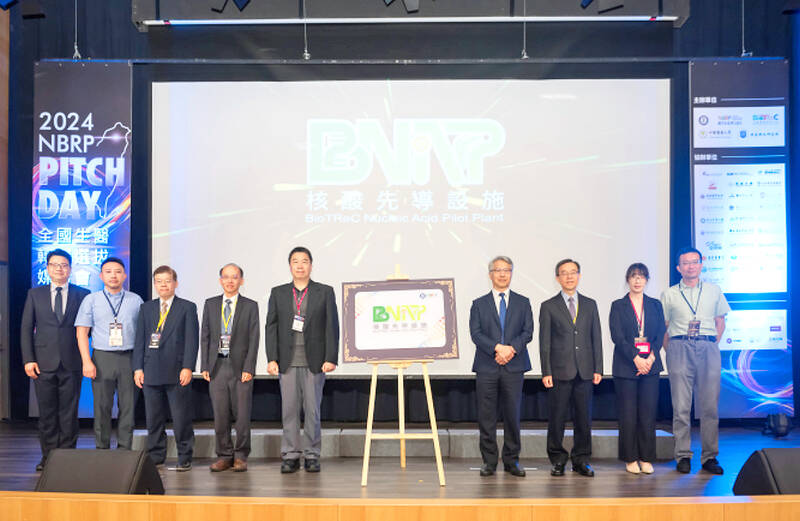Academia Sinica yesterday announced the launch of the Biomedical Translation Research Center (BioTReC) Nucleic Acid Pilot Plant during an event unveiling plaques for the National Biotechnology Research Park (NBRP) Academy and the Academic Research Translation Office in Taipei.
The announcement was made during the second annual NBRP Pitch Day, which began yesterday at the NBRP and ends today. The event invites prominent professionals in the biotechnology field in Taiwan and abroad to share their experiences and exchange views with biomedical start-ups in Taiwan.
It is jointly held by Academia Sinica’s BioTReC, the National Health Research Institutes and China Medical University, and co-organized by 27 other academic or medical institutions.

Photo courtesy of Academia Sinica
Academia Sinica President James Liao (廖俊智) said the Nucleic Acid Pilot Plant meets international standards and is expected to expedite clinical applications in the research and development of nucleic acid-based drugs.
The plant is Taiwan’s first platform that can wholly connect and augment the production processes of messenger ribonucleic acid (mRNA) and mRNA lipid nanoparticles, meeting quality control criteria and tailored to industrial needs, Liao said.
Quality control testing techniques for more than 20 drug ingredients and products have been established for small-scale designs, production and clinical tests of nucleic acid-based medications for laboratory use, to facilitate clinical research in Taiwan in line with international standards, he said.
The NBRP Academy would provide entrepreneurial training programs for people with biomedical expertise or those who aspire to start their own biomedical business, he said.
By enhancing their ability to run and operate a business, the academy would help biomedical professionals carve out a smooth career from laboratory to industry, he added.
The Academic Research Translation Office, cofounded by 27 universities and hospitals, is expected to facilitate exchanges and collaborations between the biomedical academia and industry, Liao said.

A preclearance service to facilitate entry for people traveling to select airports in Japan would be available from Thursday next week to Feb. 25 at Taiwan Taoyuan International Airport, Taoyuan International Airport Corp (TIAC) said on Tuesday. The service was first made available to Taiwanese travelers throughout the winter vacation of 2024 and during the Lunar New Year holiday. In addition to flights to the Japanese cities of Hakodate, Asahikawa, Akita, Sendai, Niigata, Okayama, Takamatsu, Kumamoto and Kagoshima, the service would be available to travelers to Kobe and Oita. The service can be accessed by passengers of 15 flight routes operated by

GIVE AND TAKE: Blood demand continues to rise each year, while fewer young donors are available due to the nation’s falling birthrate, a doctor said Blood donors can redeem points earned from donations to obtain limited edition Formosan black bear travel mugs, the Kaohsiung Blood Center said yesterday, as it announced a goal of stocking 20,000 units of blood prior to the Lunar New Year. The last month of the lunar year is National Blood Donation Month, when local centers seek to stockpile blood for use during the Lunar New Year holiday. The blood demand in southern Taiwan — including Tainan and Kaohsiung, as well as Chiayi, Pingtung, Penghu and Taitung counties — is about 2,000 units per day, the center said. The donation campaign aims to boost

ENHANCING EFFICIENCY: The apron can accommodate 16 airplanes overnight at Taoyuan airport while work on the third runway continues, the transport minister said A new temporary overnight parking apron at Taiwan Taoyuan International Airport is to start operating on Friday next week to boost operational efficiency while the third runway is being constructed, the Ministry of Transportation and Communications said yesterday. The apron — one of the crucial projects in the construction of the third runway — can accommodate 16 aircraft overnight at the nation’s largest international airport, Minister of Transportation and Communications Chen Shih-kai (陳世凱) told reporters while inspecting the new facility yesterday morning. Aside from providing the airport operator with greater flexibility in aircraft parking during the third runway construction,

American climber Alex Honnold is to attempt a free climb of Taipei 101 today at 9am, with traffic closures around the skyscraper. To accommodate the climb attempt and filming, the Taipei Department of Transportation said traffic controls would be enforced around the Taipei 101 area. If weather conditions delay the climb, the restrictions would be pushed back to tomorrow. Traffic controls would be in place today from 7am to 11am around the Taipei 101 area, the department said. Songzhi Road would be fully closed in both directions between Songlian Road and Xinyi Road Sec 5, it said, adding that bidirectional traffic controls would